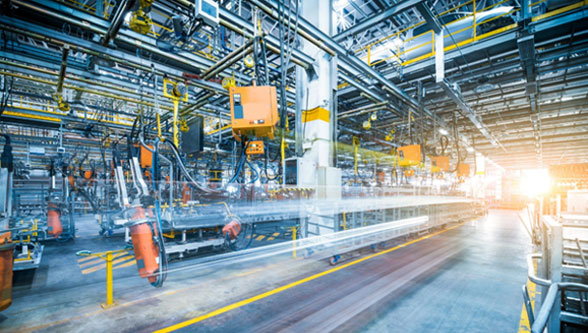The world of manufacturing has changed radically post the Coronavirus outbreak. New norms, new techniques and newly formulated legalities have impacted the manufacturing world in myriad ways. Most organisations are gearing up to adapt to the emerging matrix. There will be a gamut of fresh decisions on social distancing and sanitisation, the number of workers to be present during any particular shift, working hours, etc. The entire approach and attitude towards a familiar process have to undergo a paradigm shift. We will take a brief look at the emerging ecosystem for manufacturing activities in the post-Covid scenario.
Since the emergence of the Coronavirus, global value chains are witnessing profound changes, with important implications for the manufacturing and production ecosystem. In 2019, a framework was developed to anticipate the ongoing reconfiguration of global value chains and derive key imperatives for businesses and policy makers. The outbreak of COVID-19 is driving the change of global value delivery models, with unprecedented consequences for manufacturing and supply chains. Dealing with the impact of COVID-19 on manufacturers and supply chains requires both innovative approaches and new forms of collaboration to increase the overall resilience of the manufacturing industries. Here we would like to mention a few points which are being introduced to counter the disruptive impacts of the pandemic. The pandemic continues to disrupt manufacturing and global supply chains with debilitating consequences for society, businesses, consumers as well as the global economy.
Under the circumstances, what kind of short-term actions do companies need to take to ensure business continuity and protect employees? In which way do they prepare for the rebound and increase the resilience in their manufacturing and supply systems? Which are the forever changes that companies need to adapt to achieve long-term success?
Overall, safety is a major aspect that the pandemic has altered for the lay man as well as for the industry. Every manufacturing company is taking utmost steps to keep its employees safe and the business intact.
In order to ensure business continuity and protect employees, certain immediate actions have to be taken. Business leaders are proactively taking action to protect employees, ensure supply security, mitigate financial impact and navigate continued market uncertainty as demand drops. Companies have moved quickly to support suppliers (e.g. access to advanced network simulations), ensure cash liquidity and mitigate the impact on customers (e.g. relaxed payment terms, shifting freight modes) while contributing their part to the society (e.g. repurposing manufacturing to produce only essential goods).
Preparing for recovery and increasing resilience, initiatives to accelerate the process are already focused on creating the post COVID-19 scenario while drawing key learnings from this pandemic and its impact on global businesses. Leading multinational companies have already launched strategic initiatives to create more resilient supply chains even before the on-going crisis hit the world and are now seeing an acceleration of the speed and determination of the implementation.
The pandemic has continued to damage the manufacturing ecosystem and the global supply chains with severe consequences for society, businesses, consumers and the global economy. Since the start of the outbreak, the global production system has been challenged by factory shutdowns, demand surges for essential goods, stockpiling and panic-buying, as well as shifting consumer preferences (e.g. online over physical). This has raised new and unprecedented questions on the level of resilience of global value chains and the overall approach to manufacturing. Facing up to these disruptions requires new forms of collaboration across companies and industries to ensure business continuity while protecting employees and improving supply systems resilience for the future. As global value chains have traditionally been optimised for cost-competitiveness reasons, the COVID-19 pandemic proves that companies need to reorient towards new approaches, which are prone to “risk competitiveness”.
Manufacturing companies also need to build new strategies in collaboration with governments to be able to adapt and respond to future shocks. Recognising this need, the World Economic Forum, in collaboration with Kearney, brought together C-level executives from different industry sectors to identify best responses to the current COVID-19 crisis, in the immediate term, and help develop resilience across manufacturing and supply systems by incubating new business partnerships and public-private cooperation.
The impact of COVID-19 on global value chains requires strengthened global cooperation. The World Economic Forum’s Platform for Shaping the Future of Advanced Manufacturing and Production, in collaboration with Kearney, will continue engaging leaders across industry sectors – from healthcare and automotive, to consumer goods and transportation and logistics – as well as governments, academia and civil society to understand industry-specific needs and develop collective action plans aimed at strengthening manufacturing and supply chains’ resilience.
One of the take-away from the World Economic Forum’s initiative is supporting businesses and governments to upgrade manufacturing and investment strategies, and updating industrial policies. It further provided a platform for discussion and knowledge sharing among leaders in manufacturing and supply systems – Integrating, aggregating and amplifying existing collaborations and global initiatives that support the reconfiguration of global value chains while delivering value to businesses, society and the environment.
Senior operations and supply chain executives are focusing on five key areas to increase the resilience of their manufacturing and supply systems:
- Adopting the overall supply chain set-up by carefully managing interdependent levers such as dual sourcing, complexity reduction and localising.
- Doubling down on investments in advanced manufacturing technologies that were attributed an essential role in ensuring a quick reaction to the crisis.
- Adjusting the operating model to allow for a more flexible and decentralised manufacturing organisation with a consistent risk management system in place.
- Redefining external relationships and capturing new opportunities from cross-industry collaboration models.
- Reviewing and challenging the product portfolio to reduce complexity and refocus on key strategic directions.
 However, the long-ranging impact of the COVID-19 pandemic is yet to be understood. A number of industry sectors have been severely impacted and there are changes to daily life, accelerated by the pandemic and supported by technology and innovation, which companies will need to adapt to. Several consistent key imperatives emerged for leaders to ensure the long-term success of manufacturing and supply systems: Rapid tailoring of manufacturing and supply systems to changing consumer behaviour.
However, the long-ranging impact of the COVID-19 pandemic is yet to be understood. A number of industry sectors have been severely impacted and there are changes to daily life, accelerated by the pandemic and supported by technology and innovation, which companies will need to adapt to. Several consistent key imperatives emerged for leaders to ensure the long-term success of manufacturing and supply systems: Rapid tailoring of manufacturing and supply systems to changing consumer behaviour.
Some of the imperatives are: Agile and smart manufacturing and supply system set-ups enabled by advanced technology. Logistics coordination across and within global value chains and adoption of new ways of working and governing to increase manufacturing resilience. Shared responsibility and collaboration among companies and authorities also have to address social and environmental challenges.
For better or worse, COVID-19 is accelerating the evolution of manufacturing and this article aims to inform a better transition. The world has seen similar disasters – SARS crisis in 2003, tsunami disaster of 2004, Global Financial Crisis in 2008 – but COVID-19 is different.
It is a global crisis. The virus has spread to all the continents within a few short months, creating a shockwave of disruption that left little time for preventive or remedial action by local economies and societies. All major economies are affected. Previous crises have typically been concentrated in one sector, or one region, but COVID-19 is a global crisis that has impacted over 75 per cent of the world’s global manufacturing outputs.
High interdependency in global trade increased globalisation of value chains leading to the fact that any disruption is amplified, and recovery is more painful and prolonged. Mitigating the impact of COVID-19 on global supply chains is too big and too urgent for any single entity to address alone. Manufacturing and supply systems have been severely challenged by extended lockdowns and difficulties with logistics, rise in customer demand for essential goods and a drastic shift away from in-store shopping to online home deliveries. To overcome this rapid disruption to both supply and demand, new approaches, knowledge-sharing and collaboration across sectors are required.
Article by Arijit Nag
Arijit Nag is a freelance journalist who writes on various aspects of the economy and current affairs.
Read more article of Arijit Nag



